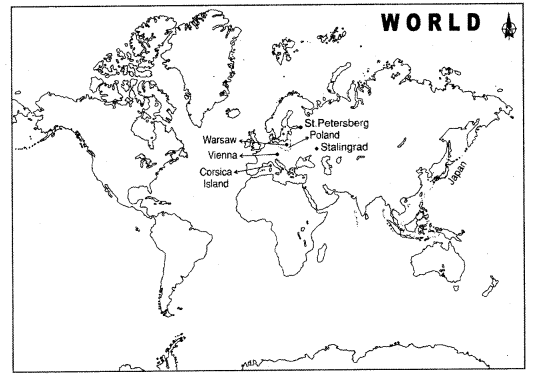TS 10th Class Social Important Questions 12th Lesson The World Between the World Wars
1 Mark Questions
Question 1.
Write any two economic reforms of Hitler?
Answer:
Hitlers Economic Policies:
- Hitler banned all strikes
- He reduced tax burden on people
- He established war industries
- He created employment opportunities
Question 2.
Observe the following graph and answer the questions?
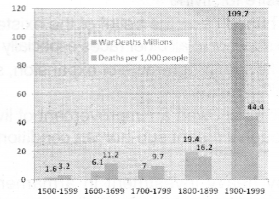
Question (a) In which century, is the number of war deaths low?
Answer:
16th century
Question (b) Why is the number of war deaths high during 1900 - 1999?
Answer:
- Two World Wars
- Use of modern weapons like nuclear weapons, poisonous gases
Question 3.
Mention any one condition laid in the Versailles Treaty?
Answer:
Conditions laid in the Versailles Treaty
- Economic conditions
- Territorial conditions
- Military cuts, restriction of naval strength
Question 4.
Write about the collective farming?
Answer:
- In U.S.S.R all small and large farmers were forced to join collective farms
- These farms were united and mechanized farming was introduced and the Produce was divided among the members
Question 5.
How did Hitler get all powers to sideline Parliament?
Answer:
Hitler got all powers to sideline parliament by passing Enabling Act
Question 6.
Write two reasons for the failure of League of Nations?
Answer:
Reasons for the failure of League of Nations are
- Superpowers were not the members of the League
- The League failed to prevent Germany, Japan, and Italy from attacking and waging war against other countries
- The member countries violated international agreements
Question 7.
What was the immediate cause for the Second World War?
Answer:
Germany invaded Poland for refusing to hand over the port of Danzig to Germany
Question 8.
What was the Intention of the Communist Party of India for helping the Britain during the Second World War?
Answer:
The Communist Party of Inca helped the Britain during Second World War as the Nazis attacked on the soviet union. Intentionally the communists helped the Britain
Question 9.
Observe the given table and answer questions (a) and (b).
Annual Expenditure on National Defence (Million Dollars)?

Question (a) Which countrys annual growth of national defense expenditure is more?
Answer:
Gemianys annual growth of national defense expenditure is more
Question (b) Write any two reasons forth. increase of defense expenditure In Britain ends Germany?
Answer:
Britain and Germany are rival countries. This led to secret Alliances, Arms race, Imperialism and always they are suspecting each other
Question 10.
How was the world divided?
Answer:
The world was divided into the West which was experiencing economic growth and the Rest whose acute backwardness was worsened by colonial exploitation by the West
Question 11.
Who called the 20th century The Age of Extremes?
Answer:
Eric Hobsbawm, a historian, called the 20th century The Age of Extremes
Question 12.
What did the world see politically?
Answer:
Politically the world saw shoots of democratic aspirations grow amidst the rise of Fascist domination which fostered ideologies of unquestioned power and hatred for other people
Question 13.
What was the change in literacy levels?
Answer:
Literacy levels and average life expectancy grew immensely for all
Question 14.
What were the two rival blocks in the industrialized countries?
Answer:
Germany - Austria - Hungary Vs Britain - France - Russia
Question 15.
Why was the First World War truly a world war?
Answer:
The First World War was truly a world war as virtually no country was left untouched by it from Japan and China in the East to the US in the West
Question 16.
How did the First World War end?
Answer:
The First World War ended In the defeat of Germany and its allies and in the victory of Britain and France in 1918.
Question 17.
How did the Second World War end?
Answer:
The Second World War ended in the defeat of Germany and its allies but before it ended it had ravaged all the warring countries
Question 18.
Who attacked on Hiroshima and Nagasaki?
Answer:
The U.S. attacked on Hiroshima and Nagasaki
Question 19.
Who led the two blocks in the Second World War?
Answer:
The Axis powers were led by Germany and the Allies led by Britain, the US and the USSR
Question 20.
What were the three main long-term factors which led to World War- I?
Answer:
- Aggressive nationalism
- Imperialism
- Secret alliances and r,l.tarism
Question 21.
What were the other forms of aggressive nationalism in a destructive mode?
Answer:
Italian Fascism from 1923 arid National Socialism of German Nazis were the other forms of aggressive nationalism in destructive mode
Question 22.
Why did Bismarck enter Into e secret alliance with Austria and Italy?
Answer:
After defeating France in 1870. Bismarck, the Gerrrian Chancelloi. decided to isolate it. To achieve this end, he entered into a secret alliance with Austria in 1879 and with Italy in 1882
Question 23.
How did the French break their isolation?
Answer:
The French broke their isolation by striking a mutual alliance with Russia in 1891 and after resolving irritants, with Britain in 1904
Question 24.
What is the result of the secret alliances?
Answer:
Instead, ot real peace, these alliances created an atmosphere of tear and armed peace in Europe
Question 25.
When did the World War - I end?
Answer:
The World War - I ended with the Conference on Peace at Versailles in 1919
Question 26.
Why was the League of Nations set up?
Answer:
The League of Nations was set up to prevent wars in the future
Question 27.
How was the League of Nations hoped?
Answer:
The League of Nations was hoped that it would help eliminate wars through collective security and settle disputes between countries through arbitration or negotiation
Question 28.
What were the two Ideologies to which the workers turned?
Answer:
- Socialism and
- Communism
Question 29.
When did the Russian Revolution take place?
Answer:
The Russian Revolution took place in 1917
Question 30.
What empires were ended with the World War - I?
Answer:
The Austro-Hungarian empire, the Russian empire, the Ottoman empire, and the German errors, etc
Question 31.
What was formed for peace after the World War - II?
Answer:
The UNO was formed for peace after the World War- II
Question 32.
When did the British women get the right to vote?
Answer:
The British women got the right to vote in 1918
Question 33.
Why did the common people not want the war?
Answer:
Fatigued by military reserves and upset at economic shortages, the common people did not want the war
Question 34.
Who led Bolsheviks?
Answer:
Vladimir Lenin led the Bolsheviks
Question 35.
Why could full peace not return to Russia after October Revolution?
Answer:
Full peace could not return to Russia because there started a Civil war led by white armies of Russian Monarchists and anti-Commurwst soldiers with help from Britain, France, the USA and Japan
Question 36.
Expand the USSR?
Answer:
The Union of Soviet Socialist Republics
Question 37.
When did the Great Depression begin?
Answer:
The Great Depression began around the end of 1929 and lasted almost till 1939 when the Second World War began
Question 38.
Who was the President during the Depression?
Answer:
Franklin Delano Roosevelt
Question 39.
What was the New Deal?
Answer:
It was a programme created by the US to help the Americans and the economy
Question 40.
What were Three Rs?
Answer:
The Three Rs are:
- Belief to the victims of Depression
- Before of financial institutions and
- Steps to ensure economic Recovery
Question 41.
What else was Introduced In the US?
Answer:
The Social Security system was introduced
Question 42.
What Is meant by the Social Security system?
Answer:
If is a permanent system of universal retirement pensions, unemployment Insurance, and welfare benefits for handicapped and needy children m families without fathers present
Question 43.
Why did Germany face severe crises of the war?
Answer:
German economy faced severe cases after the war as It was saddled with the burden at paying war damages, etc
Question 44.
Which act of the German government resulted In unheard-of Inflation?
Answer:
The German government began to print currency notes on a large scale and this resulted in unheard-of inflation
Question 45.
How did Hitler mobilise his supporters?
Answer:
Hitler mobilized his supporters on the promise cl establishing the racial supremacy of Aryan Germans over the world and by targeting minority communities like Jews as the main cause of all problems
Question 46.
How did Hitler attack comniunism and capitalism?
Answer:
Hitler attacked communism and capitalism terming both ci them as Jewish conspiracies and prioritised to build a strong state which would counter both
Question 47.
How did he appeal to the middle class?
Answer:
Hitler appealed especially to the middle-class white fell threatened by capitalism and the Great Depression and at the the same time was opposed to working-class movement led by the Communists and Socialists
Question 48.
Name the security forces in Germany?
Answer:
Regular police in green uniform and the SA or the Storm Troopers, Gestapo (secret state police), the SS (the protection squads), criminal police and the Security Service (SD)
Question 49.
What was Auschwitz?
Answer:
Auschwitz was a killing centre
Question 50.
What happened to Hitler and his close associates?
Answer:
Hitler and his close associates committed suicide to avoid being captured and tried
Question 51.
Who sentenced the Nazis?
Answer:
The Nuremberg Tribunal sentenced only eleven leading Nazis to death
Question 52.
What is Marshall Plan?
Answer:
The USA came up with a plan to fund the economic revival of Germany and Japan. This is known as Marshall Plan
Question 53.
What were the two super powers?
Answer:
The USA and the USSR
Question 54.
What did Hitler promise?
Answer:
- Hitler promised employment for those looking for work and a secure future for the youth
- He promised to weed out all foreign influences and resist all foreign conspiracies against Germany
Question 55.
What does the term "Great Depression" signify?
Answer:
- here was a worldwide economic decline triggered by a decline In demand and fall in prices. Il was called Great Depression"
- The Great Depression began around the end of 1929 and lasted almost till 1939
2 Marks Questions
Question 1. Observe the following table and analyze the military expenditure in the World War-Iparticipant countries?
| Year |
Military expenditure in million pounds |
| 1. 1880 |
132 |
| 2. 1890 |
158 |
| 3. 1900 |
205 |
| 4. 1910 |
288 |
| 5. 1914 |
397 |
(OR)
Observe the following Bar graph and analyze It.
Graph: The Armament Race
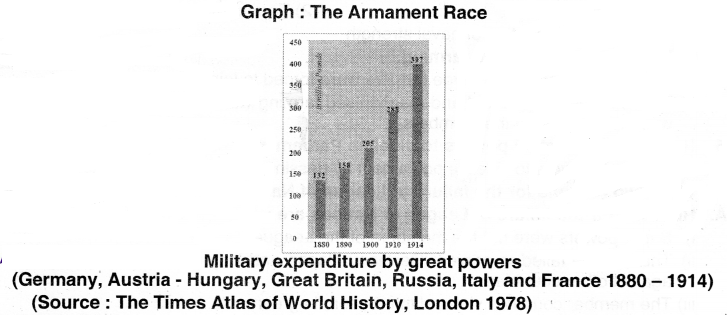
Answer:
- The graph shows that the military expenditure of the great countries has been increasing since 1880
- Mthtary expenditure increases for every lo years because of armament race
- Dunng 1914, the weapons were prepared on large scale and 397 million pounds were spent
- Since 1880 to 1914 the military expenditure increased in three folds
- Countries like Germany, Great Britain, Russia, Italy and France are some countries that spend more money on weapons
Questions 2.
Read the following paragraph and interpret How can you Justify "The women getting the right to vote was a big step"?
After a long struggle for political right like N to vote. British women got these rights in 1918. In the long lasting wars like the World Wars, industrial production and other services are necessary, Because men were In the battlefields, more women had to work in factories, shops, offices, voluntary services, hospitals, and schools. With the new confidence of becoming breadwinners, women began raising their voices for equality in all walks of life. Getting the right to vote was a big step in that direction?
Answer:
The given paragraph talks about the rights of women, especially right to vote. Men were busy with wars and so women had to work for the sake of their families, The women worked so hard for the survival of their families. As these women work for bread-winning, they gained confidence that they work equally with men and so they began movements demanding equal rights
In my opinion, the British men were in the battlefield of World War I, and at that time the women at home suffered a lot for their basic needs. The British industries, shops, hospitals also faced the problems of workers. The women decided to go for work at these places because their children were suffering of hunger. The women started working at various places to run their landlines, They earned their livelihoods by their hard work, Gradually the women became breadwinners of the 1arniIs. As they became bread wipers they got confidence
In our country some people criticise that women were not treated as equals to men arid their lives were limited to kitchen only. By reading this paragraph I understood that this situation was there in Europe also. Till 1918, there was no voting right to women and when these women went for demanding right to vote, it was considered
Women proved many times that they also perform and discharge their duties as men.Now many women are ruling the states as Chief Ministers, leading political parties as their chiefs and men working as lAS and IPS. In local bodies, 33 1/3% of seats are reserved for them. They enter into political scenarios and they are showing their ointment and talent. In conclusion, I would like to say that the women should be given equal rights in all the fields. They should be given equal opportunities. There should be security to the women at work place. Gender discrimination, sexual assault, dowry problems are to be solved
Parents should encourage girl education. Separate toilets are necessary in all the schools and colleges. So they do not become the dropouts. If government gives importance to these issues and solve them, it will be uselul to girls and women
Question 3.
Prepare a few slogans on the prevention of wars?
Answer:
- War is destructive - Peace is constructive
- Welcome to peace - Farewell to war
- Avoid wars and live peacefully
- Spread the theme of love and uproot hatred
- Respect international laws and promote international brotherhood
- Live for a good cause and preserve world peace
Question 4.
What will be the consequences of the World War that may happen after the Second World War?
Answer:
The consequences of the World War that may happen after the Second World War are
- Huge loss of life on the earth
- Destruction of properties
- Increase of environmental damage
- Existence of life becomes difficult
Question 5.
What was the Immediate cause for the second World War?
Answer:
The immediate provocation to World War Il was the German tanks driving into Poland on Seplerrder 1, 1939. Hitler invaded Poland as punishment for refusing to hand over the port of Danzig to Germany. Polish territory lay between two parts of Germany. Hitler thought the takeover of Poland will also be a small military operation. But Poland had a defense pact with Britain which jumped onto the Polish side and France joined them a day later. This marked the beginning of World War II
Question 6.
Prepare a pamphlet to creat awareness on the loss Incurred due to wars?
Answer:
Pamphlet
Consequences of wars
Wars are occured because of conquering the world and with the aim of exploiting resources of other countries. Sometimes dominance is the aim spread of ism or ideology is also proceeding to wars.
In olden days, it there was a war, only those participated n the war would die, but nowadays very dangerous, poisonous weapons are available. Ordinary civilians also die, In 1945 what happened in Hiroshima and Nagasaki of Japan. Still some people are facing the consequences.
My request lo all the country heads not to clear a way to wars. Better sit together and go for a smoother solution and avoid dangers.
Copies-2000.
Publishers
Question 7.
The world was divided into two parts: the West, the powerful countries of the world and the Rest, the smaller countries which were colonies of the western countries. The economies of the western countries were steadily growing. However, the colonies were still very backward because they were being continuously exploited by the western countries.
Read the above passage and interpret it?
Answer:
- At the beginning of the 20th century the world experienced two different blocks-the West and the Rest
- "The West" were all those countries like England, USA who were the leading industrial powers and they were experiencing economic growth
- "The Rest were all the countries of Asia, Africa, and Latin America
- They experienced extreme backwardness
- That backwardness was worsened by the colonial exploitation of these countries by the West
- These colonization and imperialism later led to World Wars
Question 8.
Study the timeline given and answer the following questions?
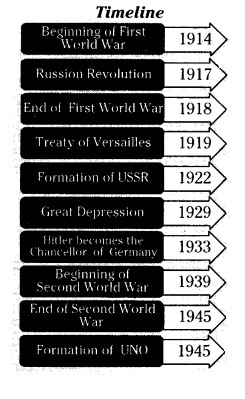
Question 1. What was the period of World War - I?
Answer:
The period of World War- I was 1914-18 AD
Question 2. Name the organizations formed after the World Wars?
Answer:
League of Nations and UNO were formed after the World Wars respectively
Question 3. Who was responsible for World War - II?
Answer:
Hitler was responsible for World War - II
Question 4. What was the period of World War-II?
Answer:
The period of World War- II was 1939-45 AD.
Question 9.
Imperialism created much stress often leading to wars- Explain?
Answer:
As industrial capital developed In the European countries like Britain, Germany, and US, they needed Markets for their products and access to raw materials. As capital further accumulated In Banks and financial institutions, they looked for safe Investment opportunities m colonies. Thus by the end of the 19th centuly there was a race for colonies between the European powers
The governments of these countries acted on behalf of their capitalists to increase their areas of influence and reduce the area under their competitors. As new industrial powers (like Japan, Germany and Italy) emerged they wanted to re-divide the colonies but the oid powers were not ready for this. This created much stress often leading to wars
Question 10.
What do you know about the Militarism?
Answer:
- MIitaflsm is the belief that military might is the best way to ensure security and war is good way to solve problems
- From 1880 to 1914, the primary expenditure of the six big powers increased by over 300%
- Three things are noteworthy In the context of militants. Each of these countries built massive standing armies, competed with each other in Increasing their armaments and budt a mindset among the people to support wars
- Large industrial complex producing arms emerged which constantly promoted the idea of using war as a solution to diplomatic problems
Question 11.
How can you say that the League of Nations was failed?
Answer:
Even though It showed a lot of promise and much was expected of it, it failed eventually to prevent Germany and Italy from violating international agreements and attacking other countries. So the World War-Il was emerged
Question 12.
What Is the change in colonies during and after the World War- I and Il?
Answer:
During the First World War, on the demand of their subjects, the colonialists accepted the principle that self-government is desirable in colonies. With the process of decolonization, after World War II. the colonies rose to Independence and hundreds of new countries were born across Asia and Africa
Question 13.
What were the changes In the map of world?
Answer:
With World War I the German, Austro-Hungariafl. Russian and Turkish empires came to an end. The map of eastern and central Europe was redrawn on the basis of nationality. economic viability and military security. When World War II came to an end, the map of the world changed yet again as ex-colonies rose to become independent nations
Question 14.
Write about the UNO?
Answer:
The United Nations Organisation (UNO) was formed after World War II. UN is a kind of world government based on four principles, viz, preserve peace, uphold human rights, respect International law and promote social progress. It works through organs like UNICEF, UNESCO. WHO, ILO, etc
Question 15.
Explain the Enfranchisement of women?
Answer:
After a long struggle for political right like right to vote- British women got these rights in 1918, In the long protracted wars like the World Wars, industrial production, and other services are necessary. With men away in the battlefields, more women had to work in factories, shops, offices, voluntary services, hospitals and schools. Beginning with the confidence of being breadwinners, women began raising their voice for equality in all walks of life. Getting the right to vote was a big step in that direction
Question 16.
What was the immediate provocation for World War - I?
Answer:
The immediate provocation for World War - I was the murder on 28th June 1914 of Archduke Franz Ferdinand of Austria by Serbian fanatics. Austria declared war on Serbia. As Serbia was with Allied Powers the Austrian attack on it led these powers to come to Serbias defence. Then the Central Powers, allied to Austria, also joined the war and this Marked the beginning of World War - I
Question 17.
What was the immediate provocation for World War - II?
(OR)
What was the Immediate cause for the second World War.
Answer:
The immeate provocation for World War II was the German tanks driving into Poland on September 1, 1939. Hitler invaded Poland as punishment for refusing to hand over the port of Danzig to Germany. Polish territory lay between two parts of Germany. Hitler thought the takeover of Poland will also be a small military operation. But Poland had a defence pact with Britain which jumped onto the Polish side and France joined them a day later. This marked the beginning of World War II
Question 18.
What was the policy of appeasement of Hitler?
Answer:
The western capitalist countries like Britain were afraid of Communist Revolution in other countries of Europe like Russia and initially encouraged Hitler and the Nazis of consolidate themselves to act as a buffer against Soviet Socialism. This was the policy of appeasement of Hitler
Question 19.
The USA could not become a member of the League of Nations." Why?
Answer:
The USA could not become a member as the US Congress refused to sanction the proposal of the President Woodrow Wilson even though he was very active n the formation of the League
Question 20.
Write about Industrial capitalism?
Answer:
Industrial capitalism had changed the way of many people earned their livelihood but only in the western countries. Some of these countries, especially Britain, were leading industrial powers but also held vast colonial empires, spread aN over the world
Question 21.
What do you know about Tearist Russia?
Answer:
Tsarist Russ4a was vast landmass spread over two continents and making ln a Euro Asian Power. Il had the third largest popiAabon In the world, viz. 156 miNion, after China and India. It comprised of several nations like the Russia, Ukraine, Uzbekistan, Kazakstan, Tajikistan, Turkomania, etc
Question 22.
What was the first Russian revolution of 1917?
Answer:
On March 8th, 1917. around 10,000 women of the capital, St Petersburg. took out a process demanding Peace and Bread. Workers joined them in this protest Unnerved at the protest in the capital, Tsar Nicholas Il ordered the army to suppress the demonstrators, even by firing at them. Instead, the soldiers joined the demonstrators
In just two days, the situation went so much out of hand that the Tsar abdicated and non aristocratic Russians made a Provisional government. This was the first Russian revolution of 1917 and Et was called the March Revolution
Question 23.
"The October Revolution was not spontaneous - Why?
Answer:
A bigger revolution was made later in October 1917 and It was not spontaneous. The liberals and aristocrats, who ruled Russia after the abdication of the Tsar, decided to continue the War to preserve the honour of the fatherland. Fatigued by military reverses and upset at economic sho1ages, the common people did not want the War
They began organizing themselves in councils which were called Soviets. Such Soviets of soldiers, industrial workers, and also people in rural areas were the expression of common peoples power which was channelized by a group of Russian Communist party called Bolsheviks
Question 24.
How did the USSR begin?
Answer:
The USSR began with a great experiment of building a country without exploiters like feudal lords. kings or capitalists The USSR tried to build a society that was industrialized and modem and yet did not have inequality or exclusion of people on basis of birth, gender, language, etc
Question 25.
Appreciate the role of Lenin in the Revolution and his economic policy?
Answer:
- Vladimir Lenin played an important role in the Russian Revolution of 1917
- He led the revolutionaries after the fall of the Tsar
- The Bolshevik party put forward clear policies to end the war
- He transferred land to the peasants and advance the slogan All power to the Soviets
- These ware the real objectives of the Russian Revolution and he fulfilled them. So Lenins name has become inseparable from the Russian Revolution
Question 26.
Write any two conditions which led to the Russian civil war In 1918-1920?
Answer:
- The Russian army began to break i.ç after Bolsheviks ordered land redistribution. Soldiers who were mostly peasants wished to go home for the land and desert.
- Sporters of private property among Whites took harsh steps with peasants who had seized land
Question 27.
Describe what happened to Germany after Its defeat in the First World War?
Answer:
- World War - I, ended with the Alkes defeating Germany and the Central Powers In November 1918
- The Peace Treaty of Versailles with the Allies was a harsh and humiliating treaty
- Germany lost its overseas colonies, a tenth of its population, 13 percent of its territories, 75 percent of its iron, and 26 percent of its coal to France, Poland, Denmark, and Lithuania
- The Allied Powers demilitarised Germany to weaken its power. Germany was forced to pay compensation amounting to 6 billion
Question 28.
What happened on 3 March 1933?
Answer:
On 3 March 1933, the famous Enabling Act was passed, This Act established a dictatorship in Germany. ft gave Hitler all powers to sideline Parliament and rule by decree. All political parties and trade unions were banned except for the Nazi Party and its affiliates. The state established complete control over the economy, media, army, and judiciary
Question 29.
Explain the condition of the people of Germany after the famous Enabling Act passed?
Answer:
People could now be detained in Gestapo torture chambers, rounded up, and sent to concentration carsps. deported at will or arrested without any legal procedures. The police forces acquired powers to rule with impunity. These powers were used to arrest and torture millions of political activists, trade unionists, and people of minority communities and build a state of unprecedented horror and fear
Question 30.
What happened In the far east with bombing of Hiroshima and Nagasaki?
Answer:
In the far east with bombing of Hiroshima and Nagasaki Japan surrendered to the USA. US armies occupied Japan but keeping in the sentiments of Japanese allowed the Japanese Emperor to continue. But it built a Constitutional Monarchy like in England. Japan was to be ruled by the elected government responsible to the Parliament (DIET)
Question 31.
Name the Indian leaders Inspired by the USSR Communist regime?
Answer:
- The experience of the USSR inspired people all over the world who were committed to the ideals of equality and national liberation
- Many of them like Manavendra Nath Roy, Rabindranath Tagore, and Jawaharlal Nehru were inspired by it even though they did not agree with many aspects of communism like suppression of opposition political parties, etc
Question 32.
How was the economic revival planned after the World War II?
Answer:
- There were many economies collapsed after World War II
- The USA came up with Marshall Plan to fund the economic revival of West European countries
- The USSR came up with a package for the revival of East European countries
Question 33.
Read the map and answer the following questions?

Question 1. Name two countries that did not fall under the German Empire?
Answer:
Portugal, Spain. Turkey, Sweden
Question 2. Which country belonged to allied block?
Answer:
England
4 Marks Questions
Question 1.
What are the causes that lead to the two World Wars?
Answer:
Causes of the World Wars I & II
Agressive Nationalism:
- The ideology of nationalism was a positive impulse
- But this ideology could also be used to create pride in oneself and hatred against neighbours
- Italian Fascism from 1923 and National Socialism of German Nazis were the other forms of aggressive Nazism in destructive mode.
Imperialism:
- By the end of 19th century, there was a race of colonies between the European powers
- As new industrial powers (like Japan, Germany and Italy) emerged they wanted to redivide the colonies
- This created much stress often leading to wars
Secret alliances:
- Triple Alliance and Triple Entente made the European powers jealous and suspicious of one another
- Instead of real peace these alliances created an atmosphere of fear and warmed peace" in Europe
Militarism:
Militarism is the belief that military night is the best way to ensure security and war is good way to solve problems. From 1880 to 1914, the military expenditure of the six big powers increased
Arms Race:
The race for armaments and stockpiling of war materials by all European countries created tensions in the world
The Treaty of Versailles:
- World War I ended with the conference on Peace at Versailles in 1919
- To weaken Germany. the Treaty of Versailles imposed some territorial penalties and military cuts on its
- Germans thought the Treaty of Versailles was a diktat imposed on them and they had no respect for It
- Failure of League of Nations was the another cause
German challenge te vengeful domination:
They wanted to recover the territories lost by them, in the Treaty of Versailles, restore
German dominance over Central Europe and end the restrictions on German armaments.
Immediate causes:
- The Immediate cause of First World War was the murder of Ferdinand of Austria
- The irradiate cause of Second World War was the Hitler attacked on Poland
Question 2.
What were the agricultural reforms of Joseph Stalin in the USSR?
Answer:
- After the death of Lenin in 1924 Stalin emerged as the leader of the Communist Party
- The USSR began a programme of planned economic development with its Five Year Plans in 1928
- This pursued a twin policy of raped industrialization and collectivization of agriculture
- The USSR under the leadership of Josepfi Stalin tried to end sma peasant production by forcing all small and large farmers to surrender their lands and join "Collective Farms" and share the products
- Farmers worked together and the produce was coded among the members of the farms
- After an milial period of decline, agricultural production soon rose and helped the USSR to also build its industries on an unprecedented scale
- All industries were owned by the state which did not allow free market system
- An extended schooling system developed, and arrangements were made for factory workers and peasants to enter universities
Question 3.
What are the Impacts of the great economic depression In the USA?
Answer:
Impacts of the great economic depression in the USA
- The Great Depression began around the end of 1929 and lasted almost till 1939 when the Second World War began
- In this period decline in demand and tall in prices
- The decline in demand led to closure of factory production which in turn meant further decline In the purchasing power of people
- 11 initially began with a stock market collapse in the U.S.A., but before long affected almost every country
- As many as 25% Americans were unemployed
- This in turn caused a collapse of prices (up to 60%) foi agricultural produce causing pauperisation of millions of farmers and stopping of cultivation
- It had devastating social consequences sharply increasing poverty, desolation, homelessness, etc
- F.D. Roosevelt who became the President of the US announced "the New Dear policy to recover America from Great Depression
Question 4.
How did the Idea of NationalIsm lead to the World Wars?
Answer:
Nationalism is a belief, creed or political ideology that involves an individual Identifying with or becoming attached to, ones nation
- The ideology of nationalism was a positive impulse
- It was the foundation of modern nation-states
- But later it became aggressive nationalism
- It is used to create pride in oneself and hatred against neighbors
- Fascists In Italy tried to build images of victories with it
- Nazis of Germany mobilised Germans against other nations of Europe
- These incidents led to World War
- Thus, we can say the idea of nation-states and nationalism influenced the desire for war during World Wars
Question 5.
Russian revolution brought in many changes In their society. What were they? And what challenges did they face?
Answer:
Changes In the Russian Society
- The immediate change was the elimination of the democratic provisional councils called Sovets in various larger cities
- Under Bolshevik rule Russia got out of World War - II
- A Socialist system was imposed on the country which all but the smallest businesses were taken over by the government
- Land was redistributed to peasant farmers and food distribution was temporarily improved
- Soon though, many people became disenchanted with the Bolsheviks and the Russian Civil war broke out in 1918 and lasted until 1920
Challenges they faced:
- Famines
- Resistances
- Low standards of living
- The Great Depression
- Unemployment
- Lack of educational facilities
- Cheap public health care, etc
Question 6.
Observe the given Europe map and answer the following question.
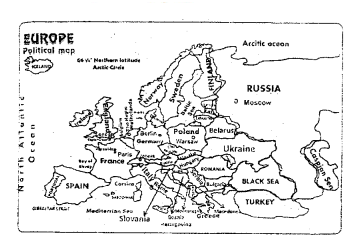 List out the Axis Power group and Central Allies group?
List out the Axis Power group and Central Allies group?
Answer:
| Axis Powers |
Allied Powers |
| Austria |
USSR |
| Germany |
Romania |
| Turkey |
Britain |
| Bulgaria |
France |
| Italy |
USA |
| Japan |
Poland |
Question 7.
Observe the following table and write a paragraph analysing It.
Annual National Defence Expenditure
(Million of Dollars)?
| Year Country |
1933 |
1934 |
1935 |
1936 |
1937 |
| Britain |
455 |
480 |
595 |
846 |
1263 |
| Germany |
253 |
299 |
381 |
2600 |
3600 |
Answer:
- The table shows that the annual defence expenditure of great countries Britain arid Germany has been increasing sInce 1933
- In the year of 1939, the expenditure increases due to the armament race, protection from enemies because already they tasted the World War I
- Government of these countries also helped to thorn to spend more money on defence. Aggressive nationalism also created pride of their country and desire of superiority in the world and also responsible to more expenditure on defence
- Million dollars were spent for defence only during the period of 1933 to 1939
- At present some countries also spend more money on defence because of enemies- If every country realises and maintains friendly relations with other countries, and they spend million dollars for peace and development of poor people, automatically the world peace will develop and every person will live with without fear of war and tension in the world
Question 8.
What are the consequences of the World Wars?
Answer:
The World Wars had a long-lasting impact on the politics, society and economy of the world. These can be enumerated as follows
- Enormous human cost: The first consequence of the wars was widespread deaths and injuries. Many persons who were under forty years of age died. The two wars also established a regime of lethal arms race, particularly of nuclear and chemical weapons
- Democratic principles asserted: The two wars also brought home the dangers of having undemocratic governments and greatly strengthened the case for democratisation of power
- New balance of power: With World War I the German, Austro-Hungarian, Russian and Turkish empires came to an end. The map of Eastern and Central Europe was redrawn on the basis of nationality, economic viability, and military security. When World War II came to an end, the snap of the world changed yet again as ex-colonies rose to become independent nations
- New International organisations: After World War I, the League of Nations was formed to resolve disputes peacefully and the United Nations Organisation (UNO) was formed after World War II
- Enfranchisement of women: After a long struggle for political right like right to vote British women got these rights in 1918. In the long protracted wars like the World Wars, industrial production arid other services are necessary. With men away In the battlefields, more women had to work in factories, shops, offices, voluntary services, hospitals, and schools. Beginning with the confidence of being breadwinners, women began raising their voice br equality in all walks of life. Getting the right to vote was a big step in that direction
Question 9.
Read the following paragraph and write your Interpretation.
USSR started a great experiment of building a country without exploiters like feudal lords, kings or capitalists. The USSR tried to build a society that was industrialized and modern and yet didnt have inequality or exclusion of people on the basis of birth, gender, language, etc?
Answer:
The given paragraph says that USSR has established a country with equality. There are no exploiters, no dominants, and no sufferers. Though if followed industrialization and modern technology arid updated life, it didnt have any inequality in any form. It is the real spirit of socialism. A country with equality and modern development is never expected in any country but it happened in USSR at that time
In any country, we can see some sort of discrimination. In some countries, discrimination born is seen in the form of colour, i.e. the Blacks and the Whites. Many countries of Americas purchased slaves from Aftica, especially from Nigeria. The Nigerians are also human beings but the Americans didnt consider like that. In some countries, the Jewish people were treated as second-grade people and they were tortured physically. Sometimes they were brutally killed in gas charrùers. In some religions, one sect of people dont consider the other sect. In our country some castes are treated as high castes and some
other castes as low. These caste, birth, gender, language-based discrimination is there everywhere. Women wages in all the sectors in unorganised fields are less than that of the men, Boys are sent to higher education whereas the girls are not sent because of various reasons like safety and security
Many countries have mentioned n the preamble of their constitutions that they give importance to equality and there will be no discrimination in any form. In olden days kings and feudal lords ruled our country. Though a few kings gave importance to the voice of the people, many of them ignored and so the poor people were humiliated. They didnt have proper respect
In conclusion, I would say that every country should maintain equality. The downtrodden should be Lifted. A country with equal treatment Is always an ideal one to all the nations
Question 10.
Read the following paragraph and write your interpretation.
"The Nazis police powers were used to arrest and torture millions of political activists trade unionists and people of minority communities, especially the Jews. They did all this to build a state of horror and fear?
Answer:
The given paragraph conveys about the cruel policy of the Nazi soldiers. Hitler arrested and tortured millions of German political leaders and activists, trade union leaders. Minorities were also targeted. This situation created a horrible state under the leadership of Hitler in Germany
When Hitler won the elections of 1932 he brought the Enabling Act and many special forces like Gestapo, protection squads, and security services besides different troopers. These forces worked brutally and created horror and fear among the people
Hitler did not allow any political party or trade union to work out. He instructed all the people to follow the Nazis. There was no peace. He treated the Jewish people as his enemies. He sent them to concentration camps and most of them were killed in gas chambers. If the trade unions were allowed to fight for the sake of the workers, the target of Hitler would be failed
He thought that everyone should follow what only he suggested. It shows us how adamant Hitler was in implementing his law. If Hitler followed democratic principles, he wouldnt bring the Germans on to common platform. As there were many conditions In the Versailles Treaty on Germany. Hitler decided to take revenge
Everyone criticized Hitler mainly because of his cruel treatment with the Jewish people. The whole Germany was horrified of his activities. Hitler created different types of police forces to control and order the society to be favour with Nazis. German state police were secretly organised. One who opposed or criticised Hitlers policies were arrested by Gestapo and killed them in concentration camps
In conclusion, I feel that Hitlers activities are unlawful and undemocratic. He imposed his policies in a cruel way. Many of the innocent were illiterate. Nowadays all the countries are moving towards democratic governments. Towards a democratic government a successful one, literacy rate is the dominant feature. All the countries should concentrate on literacy rate and so various programmes are to be taken up and implement strictly so that there will be no scope for such situation in any country
Question 11.
What are the situations that led to strengthening Nazism in Germany?
Answer:
The situations that led to strengthening Nazism in Germany
- Burden of paying war damages
- Inflation increased
- Econorr was worst hit by depression
- Unemployment increased
- Savings of the people diminished
- Small businessmen were ruined
- Big businessmen were in a crisis
- Organised workers could manage to survive
- Peasants were affected by tall in agricultural prices
- Women were unable to feed their children
- No stable rule
Question 12.
What are the important developments that took place in the first half of the 20th century? Explain any two of them?
Answer:
Eric Hobsbawm. a historian, called the 20th century The Age of Extremes Politically, the world saw shoots of democratic aspirations grow amidst the rise of Fascist domination which fostered ideologies of unquestioned power and hatred for other people. Literacy levels and average life expectancy grew immensely for all. New forms of art like movies emerged. Scientific knowledge rose to new heights unlocking the secrets of atoms and life
Women, who constitute half the worlds population, got their right to vote in this period, starting with the West. Literally more than a hundred nations walked to independence and freedom across the world. This was also an age of great experimentation as people strove to build socialist societies based on the principles of equality and fraternity or alternatively a liberal democracy based on political liberty and capitalist economy
But the same period saw the -Great Depression causing massive unemployment and economic breakdown and two World Wars in which millions died and the lives of many more millions were dislocated. Hence, the 20th century was a period of great expectations experiments and dangerous developments
Question 13.
Observe the following Bar-graph and analyse It?
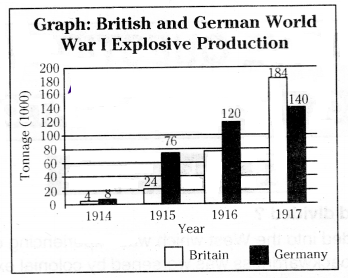
Answer:
- The given bar graph Is about the Explosive Production of two developed industrialised countries of West, i.e. Britain and Germany during World War I
- Both countries belonged to two enemy groups or blocks
- In 1914 the explosive production of Britain and Germany is 4 tonnes and 8 tonnes respectively
- From that year onwards the production increased on a large scale in both the countries
- The difference is that the explosive production is less for Britain when compared to Germany in 1914
- But this situation reversed in 1917. The explosive production of Britain increased by over 45 times, i.e. from 4 tonnes lo 184 tonnes during the years from 1914 to 1917 whereas the production of Germany increased by approximately 18 times, i.e. from B tonnes to 140 tonnes for the same period
Question 14.
Observe the following Bar-graph and analyse It?
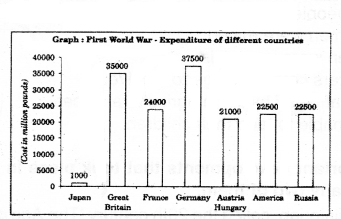
Answer:
The given graph is about the First World War- expenditure of different countries, Cost in million pounds rs given in the graph. The countries shown are Japan, Great Britain. France, Germany, Austria Hungary, America and Russia
The country that spent the highest amount is Germany, the amount is 37500 million pounds. The country that spent the lowest amount is Japan. the amount is 1000 miNion pounds. World Wars were held during 1914-1919 and 1939 -45. Many countries in the world faced great tragedy. Colonialism, imperialism, occupying the resources of other countries was the aim et many European countries. For mutual protection, marry counties formed into military groups. As the Serbian killed the Austrian prince the First World War was started
Great Britain also spent 35,000 million pounds on armament race. When the Austrian prince was assassinated, the World War broke out. The countries joined either side of the Austria arid Serbia and at last many countries participated in the war. In olden days, In the war of Ram- Rayana, those who participated would die or affected. Nowadays If a war takes place, those who are not related to war also will die or affected
It is better to prevent wars. My suggestion is that the countries should sit together and go for bilateral negotiations. The world organizations should be strengthened
Question 15.
Study the following graph and answer the questions?
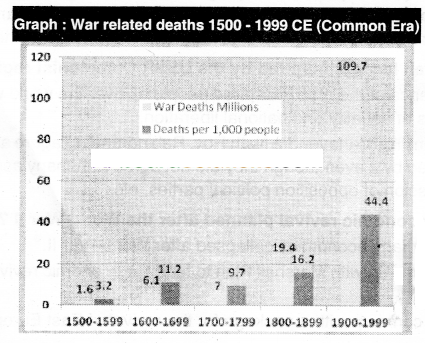
Question 1. What does the above graph represent?
Answer:
- The first bar column tells us the total number of deaths recorded during the century
- The second bar column tells us the proportionate death due to wars
Question 2. Which century experienced decrease In the proportionate death rate?
Answer:
1700-1799 experienced a decrease in the proportionate death rate, i.e. from 11.2 in 1600-1699 to 9.7 In 1700-1799
Question 3. Why were the war-related deaths high between 1900-1999?
Answer:
The world experienced two World Wars between 1900-1999. Hence the war-related deaths were high
Question 4. Compare 18th century with that of 20th century?
Answer:
Less than four people out of thousand died In the 16th century while it rose to 44.4 in the last century, i.e. nearly 4.5% of people died
Question 16.
Why was the 20th century a period of great expectations, experiments and dangerous developments?
Answer:
Eric Hobsbawm, a historian, called the 20th century The Age of Extremes.Politically. the world saw shoots of democratic aspirations grow amidst the rise of Fascist domination which fostered ideologies of unquestioned power and hatred for other people. Literacy levels and average life expectancy grew immensely for all. New forms of art like movies emerged. Scientific knowledge rose to new heights unlocking the secrets of atom and
life
Women, who constitute half the worlds population, got their right to vote in this period, starting with the West. Literally more than a hundred nations walked to independence and freedom across the world. This was also an age of great experimentation as people strove to build sociatist societies based on the principles of equality and fraternity or alternatively a liberal democracy based on political liberty and capitalist economy. But the same period saw the Great Depression" causing massive unemployment and economic breakdown and two World Wars in which millions died and the lives of many more millions were dislocated. Hence, the 20th century was a period of great expectations, experiments and dangerous developments
Question 17.
Why did the Treaty of Versailles impose some territorial penalties and military cuts on Germany and what are they?
Answer:
To weaken Germany. the Treaty of Versailles imposed some territorial penalties and military cuts on it. Firstly. Germans were asked to return their colonies in Africa occupied in the 1880s arid European areas like Alsace and Lorraine which they occupied from France in 1871. Secondly, Germany was asked to pull down its army strength to 100,000 from 900,000 during World War I. It was also asked not to have submarines and restrict
its naval strength to six battleships of less than 10.000 tonnes and a dozen torpedo boats and destroyers each
Question 18.
Aggressive nationalism paved the way for world wars - Interpret?
Answer:
- Aggressive and narrow nationalism was one of the causes for world wars
- Nationalism was a positive impulse and the force behind unification of Italy and Germany
- If nationalism was aggressive, it could create pride in oneself and hatred against neighbours
- There existed a deep-seated antagonism between Germany and Russia: Germany and France; till First World War
- Italian Fascism from 1923 and National Socialism of German Nazes were other forms of aggressive nationalism in destructive mode
- They built wages of ruling over the world and mobilised their people against other nations
- They took a death blow in the Second World War
- Thus we can say that aggressive nationalism paved the way for world wars
Question 19.
How far were secret allIances the cause for the World War - I?
Answer:
- After defeating France in 1870. Bismarck, the German Chancellor decided to solve It
- To achieve this end, he entered into secret alliances with Austria and Italy thus formed Triple Alliance In 1882
- The French broke their isolation with alliance with Russia
- Again they resolved their irritants with Britain
- Thus Russia, France, and Britain formed their Triple Entente in 1907
- These European countries formed secret alliances to safeguard their freedom, economic and commercial interests
- These secret alliances made European powers jealous and suspicious of one another
- Instead of real peace, these alliances created an atmosphere of fear and armed peace in Europe
- Thus we can say secret alliances were a justifiable cause for the World War I
Question 20.
Interpret the formation of power blocks as a cause for world wars?
Answer:
- The world during late 19th century was divided into nation states
- They were grouped into power blocks and degenerated into war camps
- The process of nation formation accelerated the scramble among industrialised nations for control over the world
- All nation states wanted to have greater say in world diplomacy and their armies to back up national interests
- Two main blocks emerged were the Centre and the Allies
- Even enemies of the past like Austria and Italy or Britain and France formed the part of a same block
- Similar blocks continued till Second World War the axis powers led by Germany and the allies led by Britain. the USA and the USSR
- Thus the formation of these blocks was a reckonable cause world wars
Question 21.
What were the special factors that resulted In World War II?
Answer:
- There were a few factors that resulted In World War II
- Germany was not moved to the Treaty of Versailles, peace conference after World War I
- It was asked to return colonies, pull down Its army strength
- The League of Nations, which was supposed to settle disputes through collective security faced to prevent countries violating nternatonal agreements
- Germans under Hitler wanted to revenge the terms of Treaty of Versailles
- They recovered lost territories, restored their dominance and industrialized themselves
- They tried to prevent communist revolutions throughout Europe
- Hitler made non-aggression pact with the USSR and turned against Britain and France
- Hitlers attack on French-supported Poland is the immediate cause for the outbreak of the Second World War
Question 22.
What steps would you suggest to prevent these world wars among the countries?
Answer:
To prevent world wars, all the countries on the earth must follow the following steps
- The countries one and all should be up their attitude of aggressive nationalism
- Every country should be ready to disarmament action of herself
- All the countries should promise to stop the usage of nuclear and chemical weapons
- Every country should be committed to development, not but to arms race
- Every country should respect the sovereignty and integrity of all other countries
- Every country should pledge to not to interfere in the internal affairs of other countries
- Countries must negotiate or go to International Court of Justice in casa of disputes, but not to resort to wars
Question 23.
Observe the following graph and answer the questions?
Question 1. What do you know from the given graph?
Graph: The Armaments Race
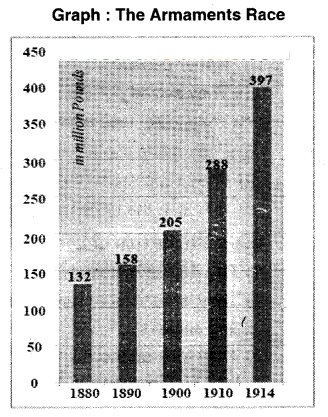
Answer:
The graph shows that the military expenditure of the great countries has been increasing since 1880
Question 2. In which year were the weapons prepared In large scale?
Answer:
During 1914, the weapons were prepared in large scale
Question3. Why did the military expenditure increase for every 10 years? Go
Answer:
Military expenditure increases for every 10 years because of armament race
Question 4. What are the countries that spend more 100 money on weapons?
Answer:
Countries like Germany. Great Britain, Russia, Italy and France are some countries that spend more money on weapons
Question 5. How much was spent on military expenditure In 1914?
Answer:
Money spent on military expenditure In 1914 was 397 million pounds
Question 24.
Why did the economic crisis create deep anxieties and tears In German people after 1929?
Answer:
The economic cnsis created deep anxieties and fears in people. The middle classes especially salaried employees and pensioners, saw their savings dirrwnisti when the currency lost its value. Small businessmen, the self-employed and retailers suffered as their businesses got ruined. These sections of society were filled with the fear of paupensation, an anxiety of being reduced to the ranks of the working class, or worse still, the unemployed
Only organised workers could manage to keep their heads above water, but unemployment weakened their bargaining power. Big business was In crisis. The large mass of peasantry was affected by a sharp fall in agricultural prices and women, unable to till their childrens stomachs, were tilled with a sense of deep despair. This caused acute political instability as government after government collapsed and could not provide a stable rule
Question 25.
Describe the course of Russian SocLallat Revolution in 1917?
Answer:
- Russian Socialist Revolution in 1917 took place m two phases March 1917 and November 1917
- 10,000 women took procession demanding peace and breað and were supported by many, later
- In Just 2 days Tsar Nicolas II abdicated the throne and provisional government was set up in March 1917
- wished to continue the war and economic shortage was not addressed
- Soviets (the councils of peasants, workers and soldiers) were organised by Bolshevik leader Lenin
- They seized political power from provisional government
- They took steps to end the war and redistributed the land
- They made control over prices and nationalised industries, banks. etc
- They suppressed the long-drawn civil wars
- By 1924, the USSR - Union of Soviet Socialist Republics - was formed
Question 26.
Estimate the role of Lenin and Bolsheviks In the formation of the USSR?
Answer:
- The Bolsheviks were led by Vladimir Lenin
- They were able to win the confidence of the Soviets (councils of peasants, workers and soldiers)
- They took up the demand for immediate peace unconditionally, nationalization of all land and its redistribution to the peasants and control over prices and nationalisation of all banks
- The Soviets under Bolsheviks seized power from provincial government and immediately ended the war and redistributed the land
- Full peace could not be restored as anti-communist soldiers supported by Britain, the USA, France and Japan started a civil war
- They were all defeated by 1920
- The Bolsheviks announced the ending of the Russian empire and permitted the various nations under it to become independent
- However, gradually most of the former Tsarist empires nations agreed to join the Union of Soviet Socialist Republics (the USSR) which was setup in 1924 by Soviet government in Russia
Question 27.
What was the Great Depression? How was the world effected by it?
Answer:
- The Great Depression began around the end of 1929 and lasted almost till 1939 when the World War II began
- There was a worldwide economic decline triggered by a decline In demand, tali prices
- The decline in demand led to closure of factory production which in turn meant further decline in the purchasing power of people leading to further decline in demand
- This cyclical effect caused massive unemployment and decline of real incomes of ordinary people as well as governments across the world
- As many as 25% Americans were unemployed and nearly 33°/o in many other countries
- The prices of agricultural produce were dropped by 60%
- It had devastating social consequences like sharply increasing poverty, desolation. homelessness. etc
- This was the longest and most severe economic decline faced by the modem economy till today
Question 28.
Observe the following map?
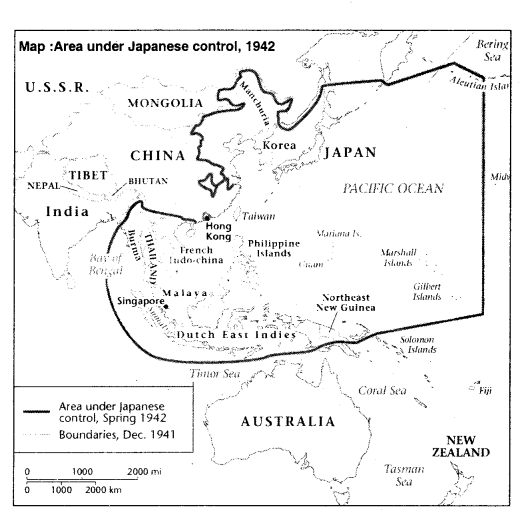
Answer the following questions after reading the map above.
Question 1. Which neighbouring country of India was occupied by Japan?
Answer:
The neighbouring country of India that was occupied by Japan was Burma
Question 2. What is Dutch East India called new?
Answer:
Dutch East India is now called as Indonesia
Question 3. Most of the area under control of Japan is a part of which ocean?
Answer:
Most of the area under the control of Japan is a part of Pacific Ocean
Question 4. Which Chinese region was under control of Japan?
Answer:
Manchuria was the Chinese region that was under the control of Japan
Question 5. Was Mongolia under the control of Japan in 1942?
Answer:
No. It was not under the control of Japan in 1942
Question 29.
Locate the following In the given map of the World?
Question 1. The country is the responsible for World War- I?
Answer:
Germany
Question 2. The capital or Russia?
Answer:
Moscow
Question 3. The Treaty of Versailles was held In the country?
Answer:
France
Question 4. The capital of America?
Answer:
Washington D.C.
Question 5. This country Declare war on Serbia?
Answer:
Australia
Question 6. In 1948 UNO created a country for Jewish people?
Answer:
Israel
Question 7. New York?
Answer:
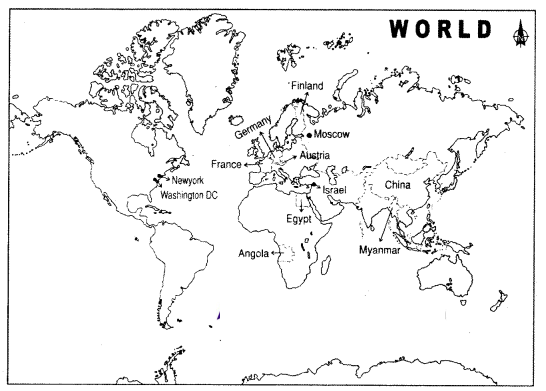
Question 30.
Locate the following in the given map of World?
Question 1. In 1939 Germany attacked on thIs country?
Answer:
Poland
Question 2. This country face more distruction due to releasing atom bombs by America?
Answer:
Japan
Question 3. Capital of Poland?
Answer:
Warsaw
Question 4. Capital of Austria?
Answer:
Vienna
Question 5. Corsica Island?
Answer:
